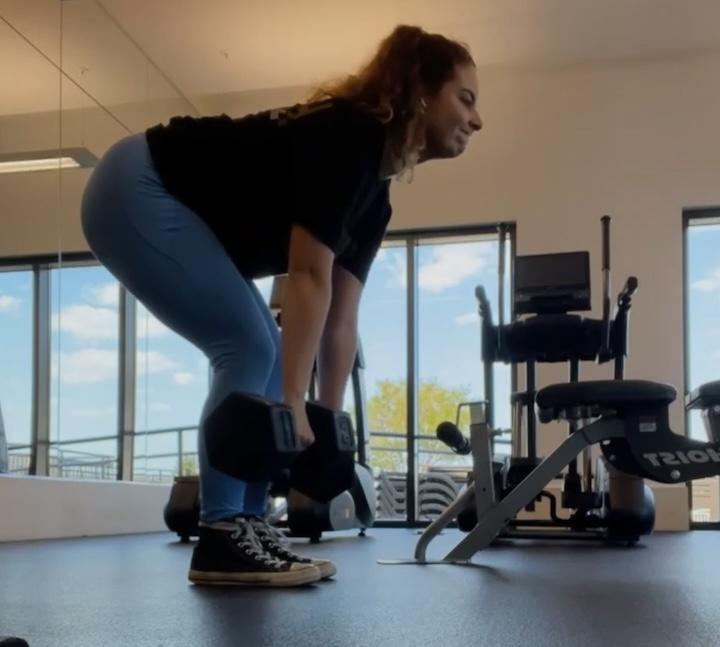I am not a morning person, but my fitness instructor-running-enthusiast mom is. She can’t go a day without working out at 6 a.m., insisting that it “throws off her whole morning” if she skips. My mom swears by this way of living, beginning her early mornings with a “casual 10-mile run,” going to her full-time desk job, then teaching fitness classes at the gym a couple evenings a week.
I prefer sleeping in and then working out between my classes in the afternoon or after work in the evening. I don’t know how my mom does it, and I don’t think I would ever be able to replicate her crazy routine and actually enjoy it, but I figured I’d give the early morning workouts a try for a week and see what the hype is all about.
I decided to try a week of one-hour workouts from 6 a.m. to 7 a.m. each day, starting with 30 minutes of strength training, followed by 30 minutes of cardio.
Colleen Smith, a part-time fitness instructor and personal trainer of 20 years from Edgewater, Maryland, has been working out in the morning for most of her life. She exercises daily at 5 a.m. or 6 a.m., seven days a week. She said it took her a couple of weeks to get the hang of the routine.
“You get used to it and the feeling you get when you’re done,” Smith said. “I mean, I wake up now without an alarm, which is crazy.”
I’ve heard about the various benefits of working out in the morning, like helping to improve weight loss, as well as working to reduce stress, decrease anxiety and boost productivity. Long-time certified personal trainer and fitness coach, and my mom’s former co-worker, Steve Sylvester, of Myrtle Beach, South Carolina, confirmed those benefits are real.
“Speaking on the scientific benefits of morning workouts,” Sylvester said, “what a lot of people don’t realize is that you’ve got to get that metabolism going. If you want to burn those calories, when you get started early in the morning, you’re gonna get that metabolism working right away.”
While Sylvester normally works out in the evenings, because of his job and roles of being a father and husband, he said if he had the choice, he would prefer to work out in the morning.
“The morning tends to be a little better to work out because it does provide you that energy for the rest of the day,” Sylvester said. “In the evenings, you’d come home from a long day at work, or a long day of being a parent or a long day of being a student, and a lot of times the last thing on people’s mind is going to work out. They just want to rest.”
Early into my one-week trial of early-morning workouts, I saw the pros.
After I finished my workout at 7 a.m., I felt energized and still had four whole hours before my first class. But, after the post-workout high wore off in the first couple of hours, I was fighting the urge to nap. I forced myself to be productive. I did laundry and started to get ahead on homework. But by the time noon rolled around, I was definitely tired. I had a feeling caffeine was going to save me this week.
By day three when my alarm went off at 5 a.m., I wanted to throw my phone across the room. Getting up in the morning knowing I could be sleeping in took a lot of discipline. I started questioning if I should continue compromising my sleep for the sake of this experiment, but I was determined to continue, hoping it would get easier.
Ed Woods, a recent La Salle University graduate, frequent gym-goer and full-time technician at Ivey Air Inc in Levittown, PA, said if he had the opportunity to workout at 8 a.m. or 9 a.m. like he did in college, he would. The only time he is able to go to the gym is after work.
“I really enjoy working out in the morning, but with work, it’s kind of difficult,” Woods said. “It’s almost impossible because I have to be at work at 6 a.m., so I’m forced to go in the evening or nighttime. And sometimes it’s difficult to build up the energy and the motivation. But most of the time, I power through it pretty well.”
Ultimately, waking up super early to workout didn’t make sense for my schedule. I see how it works for people like my mom who rely on getting their workouts in before their more sedentary day jobs. For Woods and Sylvester, afternoons and evenings work better with their schedules.
“People will make excuses for why they can’t exercise,” Smith said. “They’re ‘too busy.’ I mean, you can always fit it in. Even if you get up early, it kind of sucks initially. But, there’s really no excuse for not being able to fit it in.”
The point for all of us: Working out, whenever we do, is better than not working out at all.







































